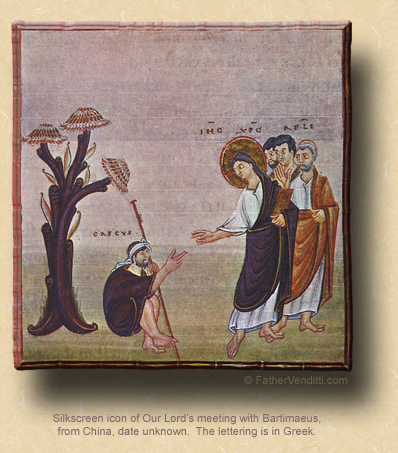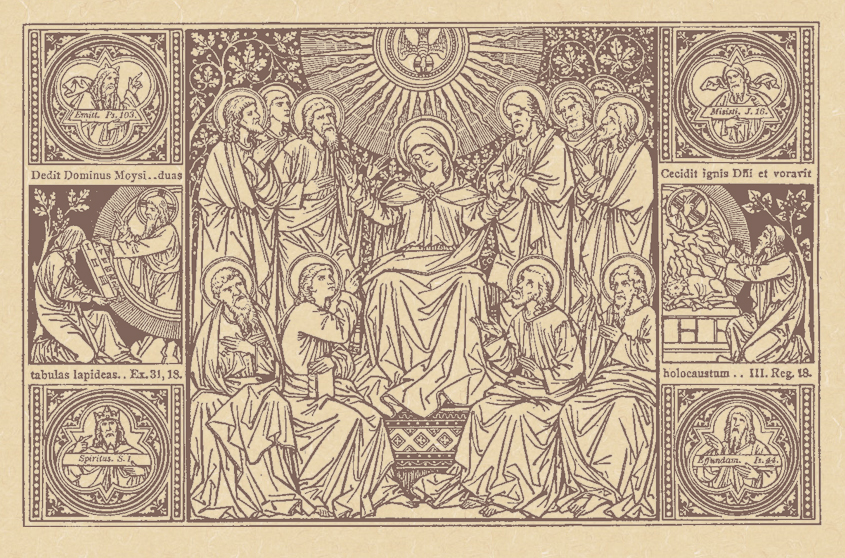Christ Is Passing By.
The Eighth Thursday of Ordinary Time.
Lessons from the primary feria, according to the ordinary form of the Roman Rite:
• Sirach 42: 15-25.
• Psalm 33: 2-9.
• Mark 10: 46-52.
Pentecost Thursday.
Lessons from the feria, according to the extraordinary form of the Roman Rite:
• Acts 8: 5-8.
• Luke 9: 1-6.*
Pentecost Thursday; and, the Feast of Our Venerable Father Nicetas, Bishop of Chalcedon.
Lessons from the pentecostarion, according to the typicon of the Byzantine-Ruthenian Rite:
• Romans 1: 28—2: 9.
• Matthew 5: 27-32.
FatherVenditti.com
|
 9:33 AM 5/28/2015 — We've spoken before about how the popular theology of the Jewish people in our Lord's time regarded a physical handicap as a sign of God's displeasure. The most explicit reference to this is when our Lord encounters the man born blind, and His own disciples ask him, “Master, was this man guilty of sin, or was it his parents, that he should have been born blind?” (John 9: 2 Knox). The incident with Bartimaeus, of which we read today, occurred much earlier in our Lord's public life, but we still see something of that same Semitic attitude toward physical imperfections, especially blindness, which explains a lot of the hostility our Lord receives from the Pharisees whenever He cures someone. The excuse given is usually something technical, such as violating the Sabbath; but, it's really the cure itself that's upsetting to them because it represents the forgiveness of sins. 9:33 AM 5/28/2015 — We've spoken before about how the popular theology of the Jewish people in our Lord's time regarded a physical handicap as a sign of God's displeasure. The most explicit reference to this is when our Lord encounters the man born blind, and His own disciples ask him, “Master, was this man guilty of sin, or was it his parents, that he should have been born blind?” (John 9: 2 Knox). The incident with Bartimaeus, of which we read today, occurred much earlier in our Lord's public life, but we still see something of that same Semitic attitude toward physical imperfections, especially blindness, which explains a lot of the hostility our Lord receives from the Pharisees whenever He cures someone. The excuse given is usually something technical, such as violating the Sabbath; but, it's really the cure itself that's upsetting to them because it represents the forgiveness of sins.
It's a little different than the so-called faith-healers of today, whatever you want to think of them. When some Protestant faith-healer lays his hands on someone and screams and shouts and appears to cure them of something, it may be a fraud—and probably is—but no one can accuse him of claiming to be God. That's not the case in the Palestine of our Lord's time: since the physical malady is believed to be the result of sin, it can only be taken away by God who alone can forgive sin. That's not a problem for our Lord, since He is God, but it would be a problem for anyone who did not accept Jesus as God.
So, there you have the context of this scene in which a blind man, sitting along the side of the road, hears a commotion and is told that Christ is passing by. Obviously, Bartimaeus has heard something of Jesus before, and cries out, "Son of David, have mercy on me!" An interesting choice of words. Last Sunday, when we looked at our Lord's sermon in the Temple on the feast of Pentecost, we noticed how many of those hearing Him rejected him as the Messiah because the prophesy was that the Messiah had to come from Bethlehem, the city of David, and most people at the time thought that Jesus was a native of Galilee, a rather low-class area populated by a lot of non-Jews, prompting the Apostle Phillip's brother, Nathaniel, to say, “Can any good come from Galilee?” I wonder how Bartimaeus knew where Jesus was actually born. Perhaps it was because their meeting was destined from before creation.
However he knew it, as soon as Bartimaeus is told that Jesus is passing by, he calls out with an exclamation which pretty much implies that Jesus is the Messiah; which might explain why some of those around him are quick to try and shut him up. This event is very early in our Lord's public life; no one is talking about Jesus as the Messiah at this point. The only veiled reference to the idea was the prophesy of Simeon, made at the time of our Lord's Circumcision; but no one would have taken old Simeon seriously.
I like to think that Bartimaeus was granted a special Grace to call out the way he did … just like us, at times: we sit along the road of life, often blind to what's going on around us, when there comes a moment of Grace which ignites a longing for intimacy with Christ; and suddenly we realize that in this person or in that situation Christ is passing by. And, perhaps, we see, even if just for an instant, an opportunity to seek holiness; and we cry out in faith, "Son of David, have mercy on me!"
But then comes the challenge, as it does for anyone who seeks after Christ passing by. When Bartimaeus cries out, "Many of them rebuked him,” says Saint Mark, “and told him to be silent" (10: 48 Knox). And who are these tempters which seek to keep us from Christ? Are they petty squabbles and arguments? Are they the easy way out? Are they pride and a desire for recognition? Are they a spirit of disobedience or the cancer of cynicism? Are they temptations against the flesh? Or are they simply spiritual laziness? We all have different ones—or perhaps we have them all—shouting at us to be silent, murmuring against our desire to meet Christ as he passes by.
But Bartimaeus doesn't listen. The temptations only stiffen his resolve to meet up with Christ passing by; and again he shouts out his messianic greeting. And Jesus was not hard of hearing: He heard him the first time.  He ignored him the first time to see if he would persevere, just as He does with us. He waits a bit. He wants us to be convinced that we need Him; He wants us to persist in prayer in the midst of our troubles. And so St. John Chrysostom encourages us, saying, "Even if God does not immediately give us what we ask, even if many people try to put us off our prayers, let us still go on praying." He ignored him the first time to see if he would persevere, just as He does with us. He waits a bit. He wants us to be convinced that we need Him; He wants us to persist in prayer in the midst of our troubles. And so St. John Chrysostom encourages us, saying, "Even if God does not immediately give us what we ask, even if many people try to put us off our prayers, let us still go on praying."
Saint Mark goes on to say that “Jesus stopped and said, 'Call him'” (10: 49 NABRE), but the word Mark actually uses is φωνήσατε αὐτόν, which is the imperative form of that verb. Jesus doesn't ask for this to happen; He commands it, because this is how Saint Mark understands our relationship to Christ: our Lord is seeking us at every moment along that road from Jericho which is our life. Get up, He says to Bartimaeus; get up off of your easy life, your petty selfishness, your silly little problems, your pride, your self-absorption, your obsession with your own desires. Get up from the ground where you are lying shapeless and without character. Muster some courage and shoulder the cross. Put on a spiritual maturity.
The Evangelist goes on to tell us that Bartimaeus “threw aside his cloak, sprang up, and came to Jesus” (v. 50 NABRE). This is Mark's understanding of our relationship to Christ: Christ cannot be reached without sacrifice. Every comfort and convenience that gets in the way must be thrown off; we must strip ourselves bare before Christ. Only after this has happened, does any real conversation with Christ begin; and, in this case, Saint Mark records it for us: "What do you want me to do for you? […] Master, I want to see" (v. 51 NABRE).
Now, Bartimaeus, of course, is asking our Lord for physical sight, because he’s blind. Sometimes we’re blind, but in a different way. We want to see answers to life’s questions. If we’re beginning a new endeavor, like getting married or having our first child or even starting a new job, we want to see so there are no surprises; we want to know what to do so that it all works out. Life, of course, doesn’t work that way; so, when we ask our Lord, “Master, I want to see,” we have to be ready for whatever the answer might be. Like Bartimaeus, we hear Christ passing by; we ask Him to stop and we invite Him into our lives; but, there’s no point inviting Him in unless we’re ready to hear what He has to say.
When we are perplexed by life’s questions, we could do worse than to take Bartimaeus as an example. Are we prepared to pray his prayer, ready to do whatever the Lord requires? As we sit by this proverbial road from Jericho which is our life, are we prepared to close our ears to the temptations that shout at us to be silent, to let Christ pass by without a word? Are we prepared to rise up off the ground of our spiritual shapelessness, to put on the character of spiritual maturity? Are we prepared to throw off whatever gets in our way? Do we have the courage to ask the Lord, face to face, to let us see what He asks of us?
It is worth reflection because, at every moment of our life, in every situation in which we find ourselves or in any person we may meet along the way, Christ is passing by.

* Throughout the Octave of Pentecost, the Gradual Psalm is omitted; it resumes during the remainder of the Pentecost season.
|

